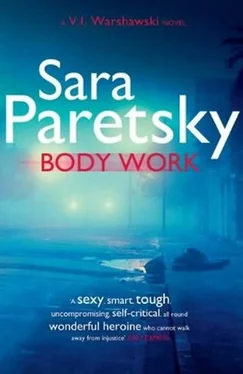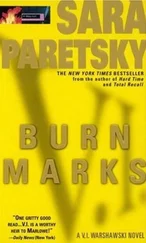Nadia and Karen Buckley, the Body Artist, filled my unquiet dreams. Buckley was in the parking lot, painting the ice-packed ruts under the blue strobes of the cop cars. When I bent to see her work, the ruts filled with blood. Olympia was trying to scoop it out with her hands before I could see it, and as she paddled it between her legs, it covered my cousin. I tried to call a warning to Petra but couldn’t speak. In the next instant, Rodney had grabbed Petra and was forcing her face down in the blood.
“Alley,” Nadia cried, as she had in my arms. “Alley.”
I woke, soaked in sweat and shivering. Nadia should have had a mother or a lover with her at her end. She should have died in her great old age, surrounded by her grandchildren. Her last thought shouldn’t have been that she was dying in an alley with a stranger.
I got out of bed, pulling the comforter around me, and went into the kitchen. It was six-thirty Saturday morning, the winter sky still black as midnight. I sat cross-legged at the table, staring sightlessly out the window. The air gradually lightened to a ghostly gray-white, but I couldn’t see anything: another snowstorm was slamming the city. I went to the window, searching for signs of life but couldn’t see even across the alley to the apartments beyond. Finally, hoping Mr. Contreras would look after the dogs, I went back to bed and slept until noon.
By Sunday, the storm had passed, leaving eight inches of new snow and a bright, bitter day in its wake. After taking the dogs for a long, exhausting walk, I spent the afternoon with Jake. We watched Some Like It Hot, which inspired him to rummage through his storage closet for a ukulele. He put on one of my sunhats and a skirt and preened around like Marilyn Monroe, so effectively that I laughed away some of the horrors of Friday night.
We were walking up Racine for a late supper when Olympia called me. “Have you seen the news?”
“What, Club Gouge is doubling its space in the wake of Friday’s homicide?”
“You have a weird sense of humor, Warshawski. No, the police found Nadia’s killer. That huge tattooed guy who kept tearing up the club. They picked him up with the gun used to shoot Nadia. Such a relief. They’ll let us open on Tuesday!”
“That is a relief, Olympia. And wonderful that you could keep such a focused perspective on Nadia’s death.”
I hung up on her demand to know “Just what do you mean by that?”
Olympia’s call effectually ended my brief sense of well-being. When we returned from dinner, while Jake practiced I looked up the news of Nadia’s killer. Web news sites can be as obnoxious as any tabloid-maybe more so, since it’s so easy to play with images.
“From War Hero to Club Killer” screamed the Herald-Star ’s blog.
An anonymous tip led police to an apartment on a quiet street in Lakeview, where the troubled vet who allegedly murdered Nadia Guaman was living. Chad Vishneski, awarded the Bronze Star for valor in Iraq, couldn’t take civilian life. He returned with a ferocious anger that moved him from random acts of vandalism to the sinister, when he began stalking and finally murdered a young graphic artist at Club Gouge on Friday.
The Chicago native was a Lane Tech football star, who went to Grand Valley State on a scholarship, but dropped out to join the Army, where he served four tours before his discharge last summer.
I clicked on a link to a video report and saw footage of a woman, her face swollen with fury.
“The police broke down the door,” she said.
The video showed a door with the wood splintered behind a yellow crime scene banner.
“When I heard the noise, I thought it was Chad. He was so angry all the time since he got home, so I went in the hall to look. Only it was the police come to arrest him. Mona, that’s his mother, she’s out of town. She let him sleep there, even though everyone knows how unstable he is. The condo board is going to have to take action, maybe evict her-we could all have been murdered.”
The video footage shifted to Terry Finchley, standing solemn-faced in the lobby of the police headquarters building, holding a gun in the approved fashion-suspended from a stick passed through the trigger guard.
“We found the perpetrator passed out in bed with this Baby Glock next to him on the floor. Our forensics tests prove that this was the weapon that was used to kill Nadia Guaman.”
Someone asked if it was true that Chad had been brought in drunk. Terry said Chad had apparently taken a drug overdose. He was in the intensive care ward at Cermak Hospital, on the grounds of the Cook County Jail complex, over at Twenty-sixth and California.
I skimmed the rest of the story. Childhood friends recalled Chad as a lighthearted, fun-loving guy. He hadn’t been a football standout, but he’d been big enough to get a Division II scholarship. Back then, “his life was, like, girls, beer, games. The war, it gave him a reason to quit school and serve his country,” one high school buddy said. “When he got home, he was so different, just angry all the time. The war really messed with his head. You couldn’t be in the same room with him.”
The county had assigned him a public defender, although right now it was an open question as to whether Chad would regain consciousness, let alone have enough brain function to stand trial. Still, the PD gallantly told the press that his client was innocent, that this was all a terrible mistake. He didn’t add that the county public defender’s office didn’t have the resources to sort out mistakes, even if Chad’s arrest turned out to be one.
Poor Nadia, crossing paths with a distraught veteran. Poor Chad, another casualty of the endless Iraq war. Poor public defender, and poor Mona Vishneski, Chad’s mother. She’d been spending the winter in Arizona, looking after her own mother, but was flying back to Chicago to be with her son.
Mona Vishneski responded to the Herald-Star ’s invasive questions with the age-old litany of mothers: “Chad is innocent. He’s a good boy. He never would have killed a girl at a nightclub.”
Of course, the maniacs in the blogosphere were out in full force, some braying that Nadia Guaman “had been asking for it,” since only an evil woman would frequent a place like Club Gouge. Others claimed that soldiers in Iraq got a taste for blood because of all the Iraqi civilians they’d been encouraged to torture and murder, and vets were bound to take out their bloodlust on innocent civilians, once they returned home.
Still others cried out against liberals who hated America and wanted to ban guns. “Obama used one of his Constitution-hating liberal stooges to commit the murder so he’d have an excuse to take away our guns,” warned one hysteric.
I switched off the computer. Chad’s life, Nadia’s death, weren’t my business, except for the way her face haunted me, asleep and awake. “Alley,” she’d whispered, her expression arrested, almost happy, as if this were a pleasant surprise, to be dying in an icy parking lot.
I went to put my arms around Jake. He smiled but didn’t stop playing. His fingers dancing up and down the strings were sinuous, erotic. My grip on him tightened. Finally, torn between desire and annoyance, he put his bow down and went to bed with me.
In the morning, I left while he was still asleep. It was dark, but I drove to the lakefront with the dogs and ran almost to the Evanston border and back, seven miles, in the thin January air, hoping to sweat nightmares of Nadia’s blood out of my pores.
By the time we returned home, the sky had lightened to a dull pewter. When I’d showered and changed, I accepted Mr. Contreras’s offer of French toast. He’d been a little hurt that I’d spent Sunday with Jake-it’s his job to fuss over me when I’ve been involved in violent crime-but, this time, his fussing had included ragging on me for getting Petra involved with Club Gouge. We’d had a fight about it Saturday night, but after a twenty-four-hour cooling off, we were both prepared to let bygones be bygones, more or less.
Читать дальше












